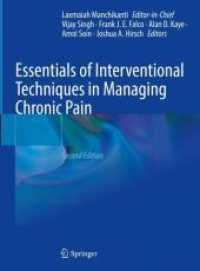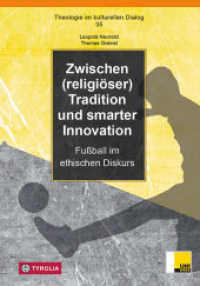- ホーム
- > 洋書
- > 英文書
- > Business / Economics
Full Description
This book illustrates how applied social scientists and their research are integrated with stakeholders and practitioners in a local/regional setting, and how knowledge development is a mutual concern, made in, and dependent on, ongoing dialogue. Focusing on the Agder region, the southernmost region in Norway, researchers and contributors question what impact the changing economic environment will have on applied researchers around the world. Applied research is seen as a vital part of the infrastructure for economic and social development, in the Agder region and beyond. The chapters are divided into four parts:
the spatial dimension of knowledge development;
understanding regional practice;
explaining regional practice;
influencing regional social practice.
A useful resource for both policy makers and researchers, the book helps readers reflect on the type of mutual competence building that applied social science research implies, and depends on, in a regional knowledge development process. It represents a voice on how to understand the development of the knowledge society at regional and global levels.
Contents
Part I: The special dimension of knowledge development
1. Developing a sustainable business model in a changing economy
Roger Henning Normann, Eugene Guribye and Kristin Wallevik
2. Why Norway has to develop its own innovation policy
Arne Isaksen
3. Knowledge transfer in different regional contexts
Nina Kyllingstad and Elisabet S. Hauge
4. Collective knowing
James Karlsen and Miren Larrea
Part II: Understanding regional practice
5. Opening or reproducing understandings
Mikaela Vasstrøm
6. Social integration of refugees
May-Linda Magnussen and Ingunn Kvamme
7. Comparative reflection
Hanne Haaland and Hege Wallevik
8. Phenomenology of music students
Elisabet S. Hauge
9. Power and knowledge
Jørn Cruickshank and Hege Wallevik
Part III: Explaining regional practice
10. Network ties between universities and cultural and creative industries
Barbara Zyzak, Rómulo Pinheiro and Elisabet S. Hauge
11. The usefulness of applied research
Christine Svarstad and Ellen Nyhus
12. Regional knowledge infrastructure
Sissel Strickert
13. The Mittelstand
Michael Ricke, Kristin Wallevik and Geir Jørgensen
Part IV: Influencing regional social practice
14. Getting China-ready
Sarah Holst Kjær
15. Business models for new experiential services
Tor Helge Aas and Geir Jørgensen
16. Commitment to sustainability in Agder
Stina Torjesen and Karen Landmark
17. Universities' external relations
Hans Chr. Garmann Johnsen







